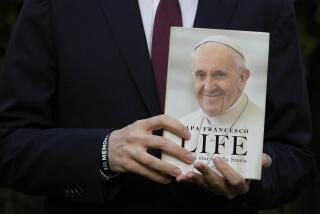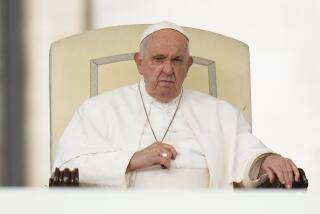Scandal, speculation surround past popes who resigned
This post has been updated, as indicated below.
The decision by Pope Benedict XVI to resign is a reminder of some colorful and controversial moments in Roman Catholic Church history.
The last pope to resign was Gregory XII, who gave up the papacy reluctantly in 1415 to help end a dispute between rival popes known as the Great Western Schism. The competing claims to the papacy had riven the church for nearly four decades before Gregory stepped down, a second pope was excommunicated and the church elected a new pope.
More than 100 years earlier, Celestine V resigned in 1294 after only five months, saying his decision stemmed from “the desire for humility, for a purer life, for a stainless conscience, the deficiencies of his own physical strength, his ignorance, the perverseness of the people, his longing for the tranquillity of his former life.”
PHOTOS: Pope Benedict XVI to step down
The former pope became a hermit before being captured and imprisoned by his successor in the castle of Fumone, where he died within a year. Some speculate that he is the nameless “shade” described by Dante Alighieri in his epic poem “Inferno,” described as the one “who by his cowardice made the great refusal.”
[Updated, 3:28 p.m., Jan. 11: Later accounts have challenged that unflattering image of Celestine. “I actually think he was pretty courageous and followed his conscience,” said Jon M. Sweeney, author of “The Pope Who Quit.” “He didn’t know how to function in a world that was dominated by canon lawyers, bureaucratic systems and issues of power. He must have thought, ‘In order to save my soul, I need to not be pope.’”]
Earlier popes stepped down amid scandal. The Catholic Encyclopedia calls Benedict IX, who resigned in 1045 after selling the papacy to his godfather, “a disgrace to the Chair of Peter.” Some accounts say he gave up the papacy so he could marry, only to change his mind after failing to marry the bride he wanted. The new pope, Gregory VI, was accused of paying for a holy office and ended up resigning a year later.
FULL TEXT: Pope Benedict XVI’s announcement
Other popes were believed to have been exiled or forced out, though historical records are murky. Any such decision is controversial. Paul VI, who was pope from 1963 to 1978, compared it to paternity. He said it could not be resigned.
Yet since at least 1917, church law has allowed for a pope to resign, according to Woodstock Theological Center fellow the Rev. Thomas J. Reese. Experts say a pope must not be induced to step down through fear or fraud, and must be of sound mind when he makes the decision, Reese wrote.
[Updated, 3:28 p.m., Jan. 11: Nearly four years ago, Pope Benedict XVI visited the basilica in L’Aquila where the remains of Celestine V are kept, and left a garment at the tomb.
“He never explained to the media or anyone else observing why he did this,” Sweeney said. “It was an unusual gesture of some kind of affinity for Celestine, a hint that he had respect for this figure from the past.”]
ALSO:
Car bomb on Turkish-Syrian border kills 10, injures dozens
Pope Benedict XVI to become first pope in 600 years to resign
Gen. Joseph Dunford becomes U.S. commander in Afghanistan
More to Read
Sign up for Essential California
The most important California stories and recommendations in your inbox every morning.
You may occasionally receive promotional content from the Los Angeles Times.










